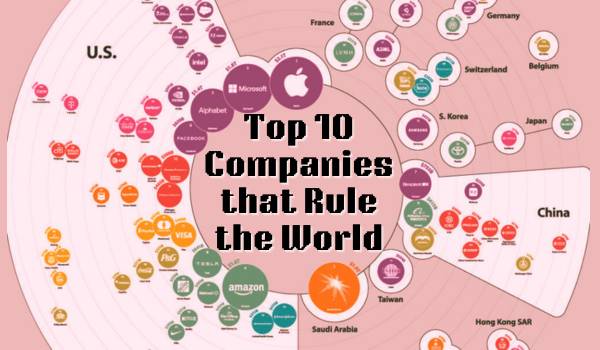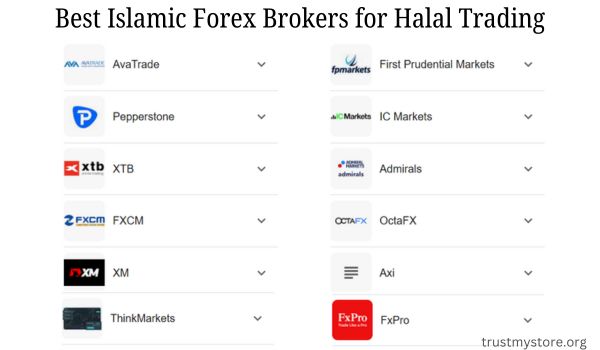Top 10 Companies that Rule the World

Companies that Rule the World– In the modern era, a small number of companies have accumulated immense power and influence, influencing whole economic sectors as well as societal mores. These businesses not only control their sectors, but they also encourage others to follow in their footsteps. This article explores the Top 10 Companies that Rule the world economy by delving into their history, marketing strategies, and overall impact on the world.
Top 10 Companies that Rule the World
i. Microsoft Corporation
When Bill Gates and Paul Allen founded Microsoft Corporation in 1975, it was a small software company. The development of MS-DOS, which served as the foundation for the IBM PC, was its big break. The subsequent introduction of Windows transformed personal computing and established Microsoft as a household name. Microsoft has grown its product line over the years, adding Office Suite, Xbox, and Azure, solidifying its position as the industry’s dominant player in computers.
There is no competition to Microsoft’s dominance in software. All around the globe, Windows and the Office productivity suite are staples in homes and businesses. With Azure, Microsoft has essentially shifted to a cloud-first strategy in recent years, and it is now the leading cloud computing platform. Furthermore, Microsoft’s focus on corporate products—like Dynamics 365 and Power BI—emphasizes its commitment to fulfilling business needs.
Microsoft has an effect on many different industries. Its acquisition strategy, which includes Minecraft, GitHub, and LinkedIn, broadens its portfolio and improves its standing in the industry. The company’s emphasis on strategic relationships and innovation helps it stay competitive in the ever changing digital landscape. Microsoft is a leader in the next wave of technical advancements due to its commitment to incorporating AI into its goods and services.
Companies that Rule the World– Microsoft has many initiatives for corporate social responsibility. The company is committed to sustainability and plans to achieve carbon neutrality by 2030. Microsoft’s AI for Good program uses technology to address issues throughout the world, such as environmental preservation and healthcare. Furthermore, Microsoft supports social justice, disaster relief, and education via its charity endeavors, which include donations and volunteer initiatives.
ii. Amazon.com Inc.
Jeff Bezos founded Amazon.com Inc. in 1994 as an online bookstore. It quickly expanded into other product categories, becoming the largest online retailer in the world. Amazon’s remarkable success has been fueled by its constant focus on innovation, customer satisfaction, and operational efficiency. Amazon began modestly in Bezos’ garage and has grown into a global powerhouse that dominates several industries- Companies that Rule the World.
Amazon has an unmatched level of domination in e-commerce. Its vast array of products, low cost, and quick delivery method distinguish it from competitors. The introduction of Amazon Prime, which offers streaming services and faster delivery, solidified customer loyalty even further. Furthermore, Amazon improves its operational efficiency and customer experience via its investment in logistics, which includes its delivery network and robots.
Beyond retail, diversification is part of Amazon’s strategy. Since its founding in 2006, Amazon Web Services (AWS) has grown to become a significant cloud computing platform that serves all types of businesses. Established media companies are challenged by the company’s foray into the entertainment industry via Amazon Studios and Prime Video. Other initiatives, including the acquisition of Whole Foods and Amazon Alexa, demonstrate the company’s commitment to innovation and expanding its influence across several sectors.
Amazon incorporates community involvement and environmental initiatives into its corporate social responsibility strategy. The company has committed to using renewable energy and electric delivery vehicles to achieve net-zero carbon emissions by 2040. Sustainability is a priority for Amazon in both its operations and packaging. Through programs like Amazon Future Engineer, the company encourages underrepresented groups to pursue STEM degrees and careers.
iii. Apple Inc.
When Steve Jobs, Steve Wozniak, and Ronald Wayne founded Apple Inc. in 1976, they were innovators in the personal computer sector. The introduction of the Apple I and the Macintosh completely changed the computer industry. The 1980s and 1990s weren’t great years, but once Steve Jobs came back in 1997, things began to improve. Under Jobs’s imaginative direction, iconic devices like the iPod, iPhone, and iPad were developed, revitalizing Apple and changing the computer industry.
Apple’s commitment to innovation is evident in the range of products it offers. When the iPhone was introduced in 2007, its sleek design, intuitive interface, and vast app store completely changed the mobile technology landscape. Similar to how the Apple Watch and AirPods revolutionized wearable technology and wireless audio, the iPad also introduced a whole new class of consumer devices. An attractive and consistent user experience is provided by Apple’s focus on seamless integration across all of its devices and services.
Apple’s financial success is a direct reflection of its market domination. Having achieved a trillion-dollar market capitalization one of the first companies, Apple has exceptional sales and profit margins. Its ecosystem, which includes services, software, and hardware, generates a loyal customer base and steady revenue streams. Its dominating position is maintained by tactics including premium pricing, constant product innovation, and expanding service offerings like Apple Music and Apple TV+.
Apple prioritizes environmental sustainability and community programming as part of its corporate social responsibility efforts. By 2030, the company promises to be carbon neutral throughout its entire supply chain and manufacturing processes. In addition, Apple uses recycled materials in its products and makes investments in sustainable energy programs. Furthermore, programs like Apple’s Supplier Responsibility program aim to enhance labor laws and working conditions across its supply chain.
iv. Alphabet Inc. (Google)
Google’s parent firm, Alphabet Inc., was founded in 1998 by Sergey Brin and Larry Page. Google quickly expanded from its beginnings as a search engine to include a wide range of online services and goods. With the establishment of Alphabet in 2015, the company was able to detach its primary internet businesses from its other endeavors, allowing for improved management and the growth of a wider range of operations.
Google is the most widely used search engine worldwide, handling billions of queries each day. Sophisticated algorithms and ongoing advancements in search technology fuel its dominance. Internet advertising was revolutionized by Google’s AdWords service, which made it possible for businesses to effectively reach specific audiences. Google’s revenue and growth have been mostly driven by the synergy between search and advertising.
The portfolio of Alphabet includes a range of technological accomplishments. Two essential parts of its ecosystem are YouTube, the leading video-sharing network, and Android, the most popular mobile operating system in the world. Google’s commitment to pushing the boundaries of technology is evident in its AI advancements, which have been made possible by initiatives like DeepMind and Google Assistant. Furthermore, Alphabet’s diverse interests are shown by its efforts in biological sciences (Verily) and driverless automobiles (Waymo).
The three main focuses of Alphabet’s CSR initiatives are social impact, data privacy, and sustainability. Google makes significant expenditures in renewable energy and intends to operate entirely on carbon-free electricity by 2030. Along with promoting customer security and privacy, the company has extensive data protection procedures. Activities that benefit the community, like Google.org’s advocacy for economic opportunity and education, further demonstrate Alphabet’s commitment to positive impact.
v. Facebook, Inc. (Meta Platforms)
When Mark Zuckerberg founded Facebook in 2004, it was first intended for college students as a social networking site. Facebook’s rapid ascent and subsequent 2012 IPO established the company as a major force in the IT industry. The company’s 2021 rebranding to Meta Platforms represents its goal to spearhead the development of the metaverse, an internet based on virtual reality.
Facebook has billions of users worldwide, and it has a huge influence on social media. The social networking industry is dominated by its services, which include Instagram and WhatsApp. The News Feed, Stories, and Messenger, among other important features, have completely changed how people connect and communicate. Facebook’s economic success is largely attributed to its advertising strategy, which uses user data for customized advertisements.
The goals of Meta Platforms are to expand its offerings and develop cutting-edge new technologies. Their dedication to producing immersive digital experiences is shown by their acquisition of Oculus VR and their investments in augmented reality (AR) and virtual reality (VR) technology. Furthermore, Meta’s AI and machine learning initiatives aim to enhance its products and services while maintaining ongoing relevance in a rapidly changing digital environment.
Meta’s CSR initiatives focus on a wide range of issues, including user privacy and misinformation. The company makes investments in programs and resources to combat fake news and raise digital literacy. To safeguard user information, data protection techniques and privacy updates are continuously developed. Meta furthermore backs community initiatives, such as providing internet access to impoverished areas and using its platforms to assist small businesses.
vi. Tesla, Inc.
Elon Musk joined Tesla, Inc. shortly after it was founded in 2003, and the company, which was founded by Martin Eberhard and Marc Tarpenning, rose to prominence under his leadership. The company’s innovation in electric vehicles (EVs) and renewable energy solutions has been fueled by its dedication to accelerating the global transition to sustainable energy. The automotive industry has changed as a result of Tesla’s creative approach and technological advancements.
Tesla’s lineup of electric vehicles, which includes the Model S, Model 3, Model X, and Model Y, has set new standards in terms of design, performance, and safety. The development of energy-efficient batteries, the Supercharger network, and autonomous driving technology are examples of the company’s focus on innovation. Tesla is always developing new battery technologies and manufacturing methods in an effort to lower the cost and increase the accessibility of EVs.
Tesla has a sizable share of the global electric vehicle industry, indicating its significant market presence. The company’s expansion into international markets—China and Europe in particular—supports its goals for growth. Direct-to-consumer sales, a vertically integrated supply chain, and strong brand recognition are some of Tesla’s competitive advantages. These components support its ability to boost output and meet growing demand.
Environmental sustainability and community benefit are the main foci of Tesla’s CSR initiatives. The firm promotes the use of renewable energy via its products, which include solar panels and energy storage systems. Tesla’s supply chain management and manufacturing methods are committed to reducing their carbon impact. In line with their mission of sustainability, Tesla also funds community service initiatives and educational initiatives.
vii. Berkshire Hathaway Inc.
Under Warren Buffett’s direction, Berkshire Hathaway Inc., which was previously a textile manufacturing company- companies that rule the world, was transformed into a diversified holding company. Making investments and acquisitions in a variety of industries, including as consumer goods, utilities, and insurance, has elevated Berkshire Hathaway to the status of one of the most valuable companies globally. Buffett’s long-term thinking and investment philosophies are essential to the business’s success.
The investment techniques used by Berkshire Hathaway are focused on buying low-cost companies that have strong fundamentals and the potential for long-term development. The corporation has significant stakes in a number of businesses, including Apple, American Express, and Coca-Cola. Berkshire’s wholly-owned businesses, such BNSF Railway and GEICO, also contribute to its diverse revenue streams. This multifaceted approach reduces risk and fosters stability all around.
The market influence of Berkshire Hathaway is widespread. Several businesses’ market performance and strategic direction are impacted by its ownership and investment situations. The firm draws in investors and business partners due to its sound financial standing and reputation for prudent management. Often called the “Woodstock for Capitalists,” Berkshire’s annual shareholder meetings demonstrate the company’s continued importance in the investment community.
Berkshire Hathaway’s businesses and financial interests are what motivate its CSR initiatives. The company funds a number of environmental initiatives, such as those that promote sustainable practices and renewable energy. Furthermore, the Buffett Foundation-sponsored charity endeavors of Berkshire focus on poverty alleviation, healthcare, and education. The company’s dedication to social impact and moral corporate conduct is shown by these initiatives.
viii. Alibaba Group Holding Limited
When Jack Ma founded Alibaba Group in 1999, it was a business-to-business (B2B) platform that connected Chinese manufacturers with overseas buyers. It has become a significant participant in the global market because to its rapid expansion into a number of areas, including e-commerce, cloud computing, and digital entertainment. Alibaba’s growth and success have been fueled by its distinct strategy and spirit of entrepreneurship- Companies that Rule the World.
Platforms that serve different segments of the market, such as Taobao, Tmall, and Alibaba.com, demonstrate Alibaba’s dominance in e-commerce. The company’s technological innovations, such as Alipay and Aliyun (Alibaba Cloud), broaden its ecosystem and provide businesses and consumers with end-to-end services. Alibaba’s competitive edge stems from its commitment to innovation and customer-centric solutions.
Alibaba has significant activities and investments abroad, which broadens its market reach outside China. The company’s global expansion is supported by strategic agreements and acquisitions like as those of Lazada and Ant Financial. Alibaba aims to alter global business, as shown by its impact on international commerce, particularly via initiatives like the Electronic World commerce Platform (eWTP).
Sustainable development and social impact are at the center of Alibaba’s CSR initiatives. The company promotes eco-friendly practices in all aspects of its operations and makes investments in renewable energy initiatives. The Alibaba Foundation is in charge of Alibaba’s charitable endeavors, which include disaster relief, education, and the fight against poverty. Furthermore, the company’s efforts for digital inclusion aim to empower small businesses and close the digital divide.
ix. Johnson & Johnson
Since its founding in 1886, Johnson & Johnson has shown a commitment to innovation in healthcare. The firm offers consumer health products, medical equipment, and medications in its diverse range. Johnson & Johnson’s focus on R&D and astute acquisitions have propelled its growth and preserved its position as a frontrunner in the healthcare industry- Companies that Rule the World.
Johnson & Johnson offers innovative medical devices and pharmaceuticals in addition to well-known consumer brands like Band-Aid, Tylenol, and Listerine. The company’s focus on R&D encourages the development of innovative therapies and solutions. Johnson & Johnson’s worldwide reach ensures that millions of people throughout the world may access its products and services.
Johnson & Johnson has a sizable share of the global healthcare market, indicating its significant market presence. The firm has expanded its product offerings and increased its expertise via notable acquisitions including Actelion and Auris Health. Johnson & Johnson maintains its competitive advantages and market leadership thanks to its commitment to quality and innovation as well as its extensive distribution network.
10 Best Free Video Generator AI in 2024
The goal of Johnson & Johnson’s CSR initiatives is to improve health and wellbeing on a worldwide scale. The organization funds initiatives that tackle issues related to public health, including access to healthcare, infectious diseases, and pregnancy and child health. Among Johnson & Johnson’s sustainability goals include lowering its environmental footprint and promoting eco-friendly supply chain operations. The business also supports community development, education, and disaster relief via its charity endeavors.
x. Samsung Electronics
Since its founding in 1969, Samsung Electronics has grown from a small electronics startup to a global leader in consumer electronics and technology. The company’s growth and diversification have been fueled by its commitment to quality and innovation. Samsung is a major participant in several industries because to its wide range of products, which includes TVs, smartphones, home appliances, and semiconductor solutions.
Samsung’s product line reflects its technological advancements. The Galaxy smartphone series, renowned for its innovative functionality and style, has set the benchmark for the industry. Samsung has made significant advances in display technology, such as QLED and OLED, which improve the visual quality of TVs and mobile devices. The company’s commitment to semiconductor technology supports its industry leadership in electronics and encourages advancements in fields like artificial intelligence and 5G.
Samsung has a significant commercial effect in a number of industries, including semiconductors, telecommunications, and consumer electronics. The company’s extensive distribution network and global presence bolster its competitive advantages. Samsung maintains its market leadership and relevance thanks to its research and development spending and strategic relationships. The company’s focus on creating innovative solutions and high-quality products increases customer loyalty and brand awareness.
The focus of Samsung’s CSR initiatives is on sustainability and community involvement. The group supports energy-efficient products and behaviors while making investments in renewable energy initiatives. Samsung takes environmental responsibility seriously, reducing its carbon footprint and disposing of technological waste properly. Samsung also supports community development and education programs that align with their mission to use technology to improve the world.
In summary
The businesses covered in this article are very influential globally and have attained incredible success. They stand out as leaders in their fields due to their commitment to corporate social responsibility, innovation, and strategic growth. These organizations’ impact on Companies that Rule the World economy and society will undoubtedly continue to be significant as they expand and adjust to changing market conditions.



